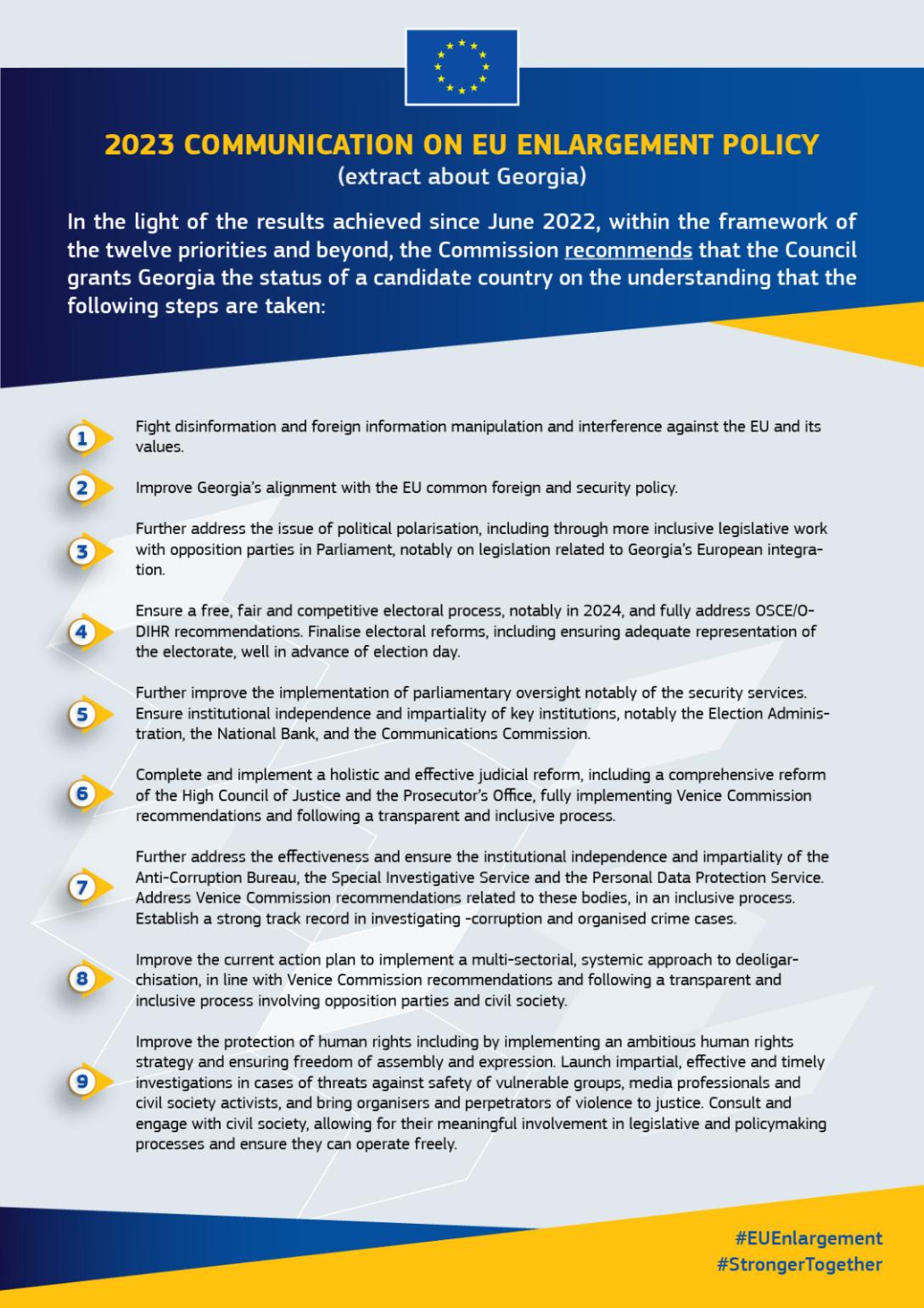2023 Communication on EU Enlargement Policy (extract about Georgia)

The Commission welcomes the reform efforts undertaken by Georgia in line with the
country’s constitution which envisages its integration into the EU as a priority for the
country. An overwhelming majority of Georgian citizens supports the country’s EU
accession process. Political depolarisation and more positive engagement by the ruling
party with opposition parties and civil society are needed to build consensus on matters of
national interest.
Georgia needs to step up its actions to counter disinformation and foreign information
manipulation and interference against the EU’s values and to improve its alignment rate
with the EU common foreign and security policy.
In relation to the twelve priorities specified in the European Commission Opinion of June
2022, Georgia has adopted legislative acts and policy actions on gender equality and on
fighting violence against women, on taking into account European Court of Human Rights
judgments in Court deliberations and on organised crime. It has appointed a new Public
Defender.
Certain procedural steps have been taken in Parliament to increase scrutiny by the
opposition. Building a strong cross-party political consensus would contribute to
addressing polarisation and accelerate Georgia’s European path. Amendments to
legislation and to parliamentary rules of procedure were adopted, in relation to the
functioning and accountability of state institutions and the electoral framework. Judicial
reform has included steps on accessibility to court decisions, reasoning for judicial
appointments, disciplinary measures for judges and the selection of Supreme Court
nominees but a holistic reform of the High Council of Justice is still needed. Georgia has
shared this legislation and several other core legal acts on the Election Code, Anti-
Corruption Bureau, Special Investigation Services, Personal Data Protection Service as
well as its action plan for de-oligarchisation with the Venice Commission for opinion. In
addition, it is important to establish a system of extraordinary integrity checks, with the
involvement of international experts, for all leading positions in the judiciary, and to
establish a system of effective assets declarations.
An action plan for de-oligarchisation, following a systemic approach, was adopted and the
“personalised” approach withdrawn. An Anti-corruption Bureau was set up. Georgia
increased international cooperation in the fight against organised crime. On media
pluralism, an opposition media director was released from prison following a Presidential
pardon, and Parliament adopted amendments to the Law on Broadcasting to align with EU
legislation. A strategy on the protection of human rights was adopted and an action plan
elaborated. A memorandum of cooperation between Parliament and some civil society
representatives was concluded to frame CSO involvement in policy-making processes.
In the light of the results achieved since June 2022, within the framework of the twelve
priorities and beyond, the Commission recommends that the Council grants Georgia the
status of a candidate country on the understanding that the following steps are taken:
- Fight disinformation and foreign information manipulation and interference against
the EU and its values.
- Improve Georgia’s alignment with the EU common foreign and security policy.
- Further address the issue of political polarisation, including through more inclusive
legislative work with opposition parties in Parliament, notably on legislation related to
Georgia’s European integration.
- Ensure a free, fair and competitive electoral process, notably in 2024, and fully
address OSCE/ODIHR recommendations. Finalise electoral reforms, including
ensuring adequate representation of the electorate, well in advance of election day.
- Further improve the implementation of parliamentary oversight notably of the security
services. Ensure institutional independence and impartiality of key institutions,
notably the Election Administration, the National Bank, and the Communications
Commission.
- Complete and implement a holistic and effective judicial reform, including a
comprehensive reform of the High Council of Justice and the Prosecutor’s Office,
fully implementing Venice Commission recommendations and following a transparent
and inclusive process.
- Further address the effectiveness and ensure the institutional independence and
impartiality of the Anti-Corruption Bureau, the Special Investigative Service and the
Personal Data Protection Service. Address Venice Commission recommendations
related to these bodies, in an inclusive process. Establish a strong track record in
investigating - corruption and organised crime cases.
- Improve the current action plan to implement a multi-sectorial, systemic approach to
deoligarchisation, in line with Venice Commission recommendations and following a
transparent and inclusive process involving opposition parties and civil society.
- Improve the protection of human rights including by implementing an ambitious
human rights strategy and ensuring freedom of assembly and expression. Launch
impartial, effective and timely investigations in cases of threats against safety of
vulnerable groups, media professionals and civil society activists, and bring organisers
and perpetrators of violence to justice. Consult and engage with civil society, allowing
for their meaningful involvement in legislative and policymaking processes and ensure
they can operate freely.
Full text of 2023 Communication on EU Enlargement Policy
